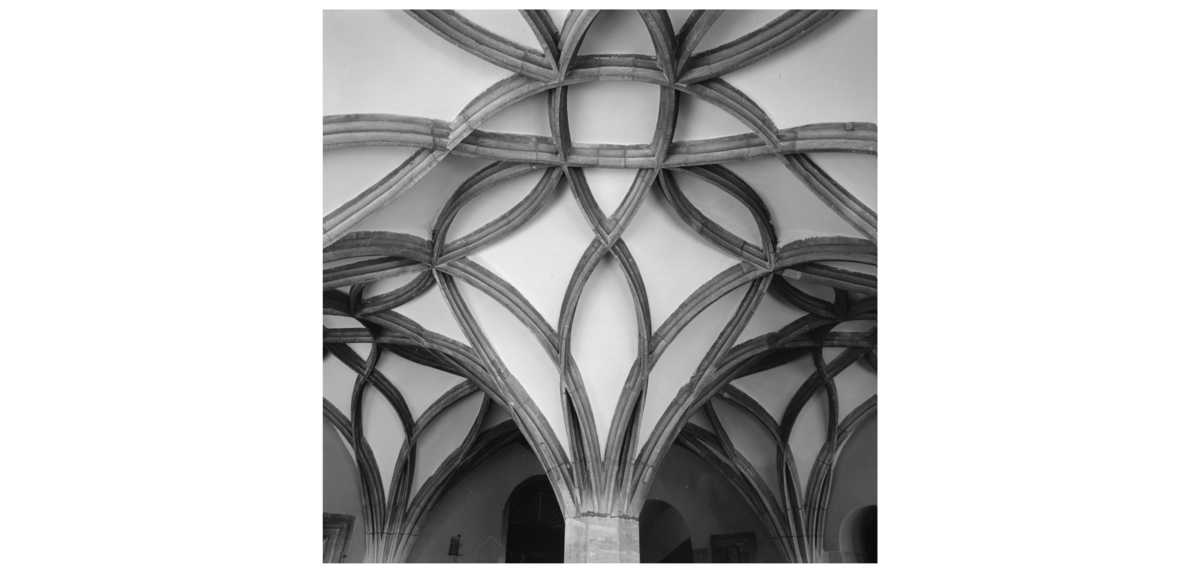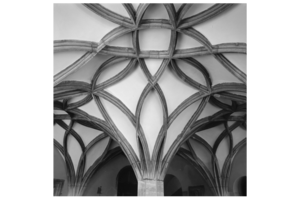Report | 19. December 2023
Forum on Specialist Vocabularies: Terminology Development and Cross-Linking with Reference Vocabularies
By Dr. Ksenia Stanicka-Brzezicka

Loop ribbed vault
"Town council meeting room of the town hall in Lwówek Śląski" CC BY SA 3.0. DE Creator: Stefan Arczyński 1970, Owner: Herder-Institut für historische Ostmitteleuropaforschung
On November 30, 2023, the NFDI4Culture online forum on Specialist Vocabularies: Terminology Development and Cross-Linking with Reference Vocabularies took place. It was held on the occasion of the completion of the task “Linking Multilingual Vocabularies” which was carried out in the NFDI4Culture framework at the Herder Institute for Historical Research on East Central Europe – Institute of the Leibniz Association in 2021–2023. 84 persons participated in the forum event, representing a wide range of disciplines and institutions, including other NFDI consortia like NFDI4Objects and NFDI4Memory.
The forum dealt with the role and significance of thesauri and reference vocabularies for cultural studies documentation work and projects. The focus was primarily on the question of how locally created, subject-specific vocabularies can be mapped to international reference vocabularies. The event and the entire task as a whole thus responded to current developments and desiderata, as the provision of terminologies and the interoperability of vocabularies are of increasing importance today, especially in the context of networked information access to heterogeneous data sources. There is an urgent need for solutions to improve the performance of full-text search systems and to build controlled terminology systems for use in structured data, including metadata.
For the documentation of cultural heritage, the Anglo-American Art and Architecture Thesaurus of the Getty Research Institute plays an important role as an established reference vocabulary. The mapping was carried out by the Herder Institute as a pilot project within NFDI4Culture. The Material Culture Thesaurus (MCT) which was jointly developed, filled with content, and maintained by the German Documentation Center for Art History - Image Archive Photo Marburg at the Philipps-Universität Marburg and the Herder Institute, served as a laboratory for this measure.
Ksenia Stanicka’s report on the challenges of a collaborative development of terminology and mapping thus opened the event. Various aspects were highlighted, from the intellectual quality of the mappings, through the embedding of terms in different hierarchies, multilingualism, different conceptualizations of knowledge in different regions or disciplines, to technical functionalities.
In the second talk, Sławek Brzezicki (Herder Institute) presented the latest developments in the “Dehio Ostmitteleuropa” project which is implementing a concept for the virtual presentation of content and the integration of contextual information for Georg Dehio’s Handbook of Art Monuments. The project uses federated thesauri as part of its acquisition strategy, including the Material Culture Thesaurus. The presentation focused on the role of thesauri in building a knowledge infrastructure, highlighting aspects like standardization, information retrieval and data mining. Special attention was given to the handling of a large number of naming variants, composites and alternative terms, which feed into the common management of search term variants in the Material Culture Thesaurus.
Hanna-Lena Meiners from the German Documentation Centre for Art History – Image Archive Photo Marburg then presented the challenges and special features of integrating standard data on buildings and new subject headings into the Gemeinsame Normdatei (GND; Integrated Authority File) as part of the pilot agency for buildings. Meiners highlighted various aspects of the historically evolved classification practice in the GND and the associated problems of integrating standard data sets. The curation of data according to the GND’s eligibility criteria requires extensive preparatory work, including the alignment of topical and geographical terms with the GND’s topical terms and geographical place names, as well as the revision of names for building designations. Special challenges also arise when functional changes to buildings occur, which so far can only be represented in free text in the GND.
The last presentation was dedicated to the German Digital Library’s subportal Collections from Colonial Contexts (CCC). Romy Köhler and Lisa Quade (Deutsche Digitale Bibliothek/Stiftung Preußischer Kulturbesitz Berlin) discussed the potentials and limitations of linking LOD vocabularies in the CCC application profile. The portal supports the reappraisal of colonial history from a museum perspective, the creation of transparency about the collections and the integration of the knowledge and perspectives of the communities of origin of the countries concerned into provenance research. Challenges and solutions for two aspects were highlighted in particual: Event-oriented representation of provenance research and the use of controlled vocabularies.
In the final discussion, several issues were clearly addressed, such as potentialextensions of the LIDO terminology, the relationship between ontology/data model and the standardized terminology used, the role of quality control, the lack of standardization, the non-congruent meanings of terms, and the diversity of regional phenomena in terminological vocabularies.
The event illustrated the complex and crucial role of thesauri and vocabularies in humanities research and emphasized the ongoing need for precise but flexible handling of term systems for effective collaboration and knowledge sharing in the community.
Materials (slides and protocol): https://cloud.nfdi4culture.de/s/CZ6YGPL4yR7nf73
